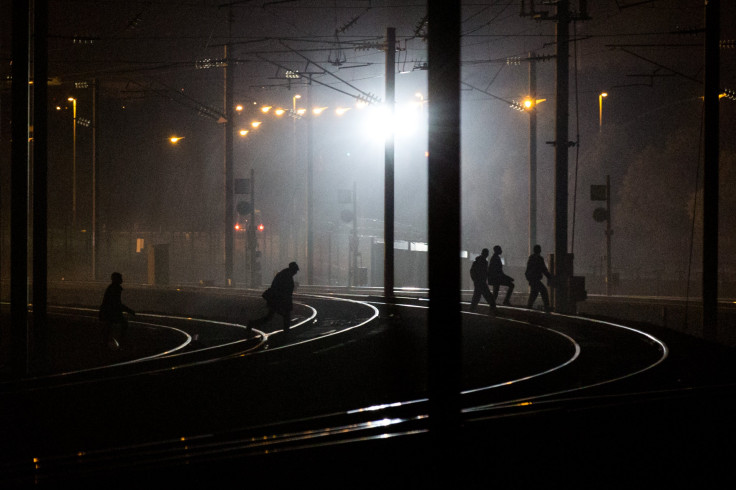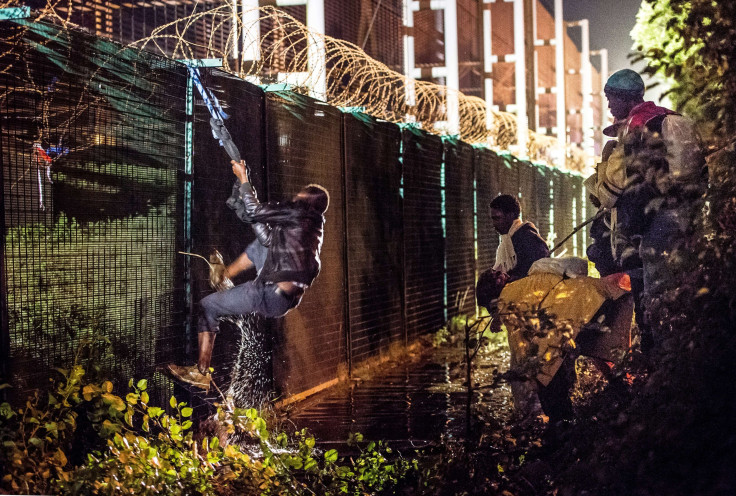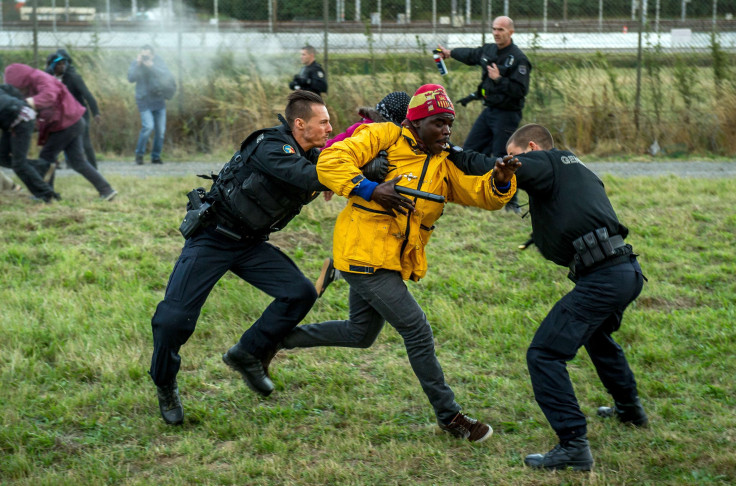Calais Migrant Crisis 2015: Refugees Risk Their Lives To Leave France For UK

The distance between Dover, England, and Calais, France, is only 30 miles. For migrants and refugees trying to cross from France to Britain through a tunnel underneath the English Channel, however, that short distance represents a dangerous journey and a risk of deportation, grave injury and even death.
As conflicts rage in North Africa and the Middle East, an increasing number of refugees in recent months have crossed the Mediterranean Sea, looking for asylum in Europe. Unable to find work in countries like Greece or Italy, they have pushed north, hoping to cross from France to Britain, where many refugees have family, or believe they would have more employment opportunities due to English-language skills. The crisis has led to heightened tensions between the two nations, with Britain faulting France for not better policing its borders and France demanding that Britain take in refugees. All the while the migrants are putting their lives at stake almost every night as they try to walk through the underground Eurotunnel connecting Dover and Calais.
Ultimate Destination
Roughly 137,000 North African and Middle Eastern migrants have arrived in Greece, Italy, Hungary and other parts of Europe since January. For many, Britain -- with its high employment rates and strong currency -- represents the ultimate final destination. But getting there from mainland Europe isn't easy. In recent weeks, some who have traveled through France to reach Britain have been struck by trains or vehicles in the tunnel, and at least nine have died.
"Many refugees and migrants don’t have a very precise idea of where they’re trying to go,” said Matthieu Tardis, a migration researcher for Institut Francais des Relations Internationales, a French think tank that studies international relations.

The migrants who have arrived in northern France live in tents near the train station in the port city of Calais. Each night, many of them attempt to rush over barbed wire fence barricades blocking the entrance to the tunnel. They run by the hundreds, dodging pepper spray-wielding national guardsmen in order to enter the Eurotunnel, through which cars, trucks and the Eurostar bullet train travel. French President Francois Hollande has dispatched riot police to prevent people from entering, but several hundred have still made it to Britain.
Fleeing violent conflict in places like Sudan, Eritrea and Syria, many refugees enter the European Union through Greece or Italy, due to their geographical proximity, seeking relief from war and poverty. Instead of finding economic prosperity, the asylum-seekers found that the southern European nations were ravaged by economic crises. But given that so many have escaped genocide or civil war in their home countries, “[I]t’s not the English Channel that will scare them off,” Tardis said.
Compared to the tens of thousands of people arriving in recent months in Greece and Italy, the estimated 3,000 people in Calais is minuscule. Like many cities in Greece and Italy, however, the problem is compounded by the fact that Calais is a struggling economic region, with few natural resources left untapped and an unemployment rate of 13 percent, leaving government officials there with very little money to care for migrants.
Still, many French government officials have remained steadfast in their support of the migrants. "I think we need to go further, and I've asked my British counterpart for an additional effort by his services," French Interior Minister Bernard Cazeneuve told French newspapers Monday, as reported by Reuters. Cazeneuve has continually asked for Britain to do its part in resolving the crisis by volunteering to take some refugees.
France and Britain are separated only by the English Channel, though the rift between them is much wider due to the Schengen Agreement. That accord, passed in 1999, created a 26-nation area in Europe where visa holders and refugees can travel freely without passport controls. Britain, however, has never agreed to be part of Schengen, therefore creating a secondary border within the EU. Britain's holdout also has allowed it to avoid taking refugees by enforcing much stricter border controls than the European Union's policies.
'No Safe Haven'
British officials have blamed France for the Calais crisis, arguing that its southern neighbor simply needs to better guard its borders. Britain is “no safe haven” for refugees, Prime Minister David Cameron warned last Thursday in a speech. Instead of volunteering to house a certain number of refugees, he sent money and materials to France to build a higher and heavier fence around the Eurotunnel entrance in Calais.
France has countered that it is doing its part to control the crush of migrants but needs help from Britain. “The British border is at Dover, not on our shores,” said Xavier Bertrand, a French politician and Cabinet member for former President Nicolas Sarkozy, in an interview Sunday with the French newspaper Le Journal Du Dimanche.

If the two nations hope to stop the flow of migrants, they must first compromise, said Eugenio Ambrosi of Belgium, the European director for the International Organization for Migration. “It is time to look at the possibility of handling these flows in Europe in a different way,” he said in a phone interview Monday. Ambrosi said the only long-term solution should be a "balanced one" that would require all European nations housing a quota of refugees.
Residents living in Calais or Dover said the presence of so many people in and near a busy transport hub has greatly disrupted their daily lives and can at times feel like a security risk.
“I’m sick of it; it’s a total mess,” said Pauline Lacroix, a 20-year-old Calais resident. Lacroix has lived her whole life in Calais and is a full-time student who aspires to become a chiropractor. She said her main concern was the transportation difficulties the migrant presence has caused, including train delays and traffic jams around the Eurotunnel.
Joe, a construction worker who lives in Dover and declined to provide his last name, said it can sometimes take him up to three and a half hours to drive one mile because of backups near the highway leading to the Eurotunnel. The traffic delays are often caused by heightened searches on all vehicles entering the country from the tunnel as officials search for signs of human trafficking.
“It’s chaos,” he said.
© Copyright IBTimes 2025. All rights reserved.






















